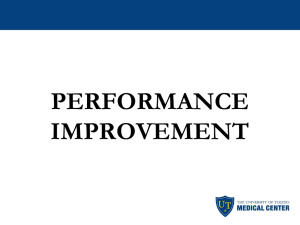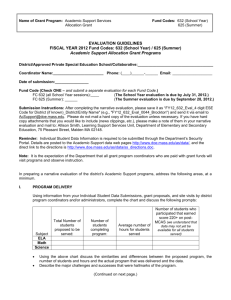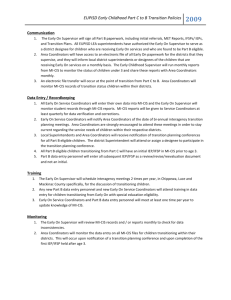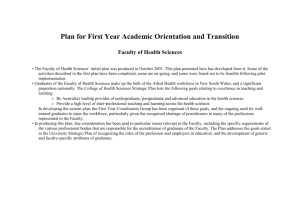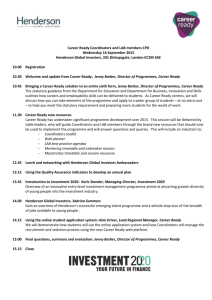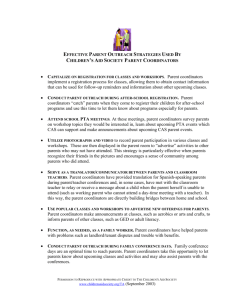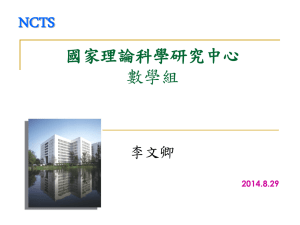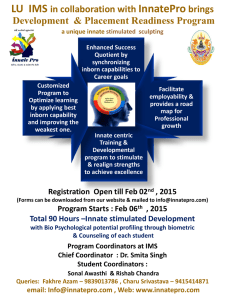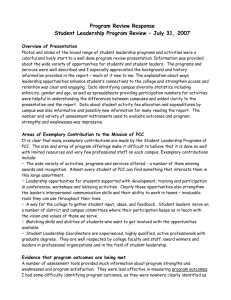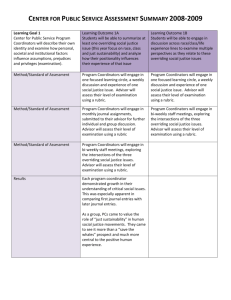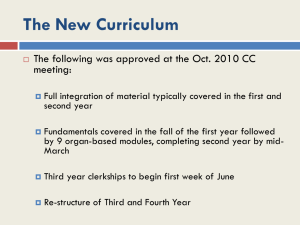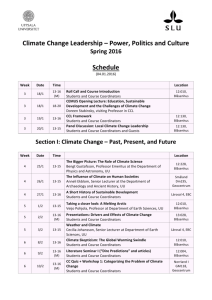Plan for First Year Academic Orientation and Transition
advertisement
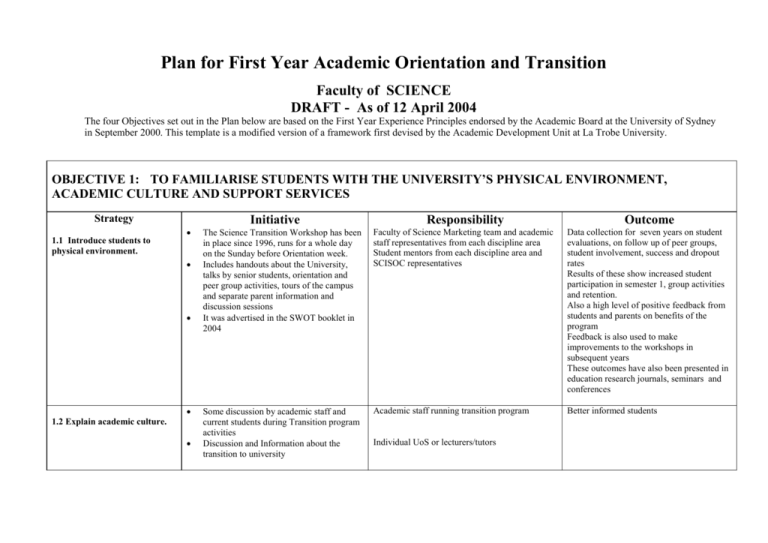
Plan for First Year Academic Orientation and Transition Faculty of SCIENCE DRAFT - As of 12 April 2004 The four Objectives set out in the Plan below are based on the First Year Experience Principles endorsed by the Academic Board at the University of Sydney in September 2000. This template is a modified version of a framework first devised by the Academic Development Unit at La Trobe University. OBJECTIVE 1: TO FAMILIARISE STUDENTS WITH THE UNIVERSITY’S PHYSICAL ENVIRONMENT, ACADEMIC CULTURE AND SUPPORT SERVICES Strategy 1.1 Introduce students to physical environment. 1.2 Explain academic culture. Responsibility Outcome The Science Transition Workshop has been in place since 1996, runs for a whole day on the Sunday before Orientation week. Includes handouts about the University, talks by senior students, orientation and peer group activities, tours of the campus and separate parent information and discussion sessions It was advertised in the SWOT booklet in 2004 Initiative Faculty of Science Marketing team and academic staff representatives from each discipline area Student mentors from each discipline area and SCISOC representatives Data collection for seven years on student evaluations, on follow up of peer groups, student involvement, success and dropout rates Results of these show increased student participation in semester 1, group activities and retention. Also a high level of positive feedback from students and parents on benefits of the program Feedback is also used to make improvements to the workshops in subsequent years These outcomes have also been presented in education research journals, seminars and conferences Some discussion by academic staff and current students during Transition program activities Discussion and Information about the transition to university Academic staff running transition program Better informed students Individual UoS or lecturers/tutors 1.3 Promote the wider student support services of the University including Learning Centre, library, health service and counselling, equity & access, financial services, computer access. Handouts on all listed areas in 'showbag' for students Faculty of Science Marketing team Increased awareness before students come Explained and discussed by academic and student on campus in Orientation week representatives at transition workshop OBJECTIVE 2: TO DEVELOP STUDENTS’ SENSE OF PURPOSE AND DIRECTION BY PROMOTING THEIR UNDERSTANDING OF WHAT THEIR COURSES INVOLVE; WHERE THEIR COURSES WILL LEAD THEM; AND WHAT THEIR LEARNING IN THOSE COURSES WILL INVOLVE. Strategy 2.1 Promote a clear understanding of why they are doing their units of study and courses, and where the units of study and courses are directed. 2.2 Promote a clear understanding of the aims and objectives; learning outcomes; learning processes; assessment methods; and teaching and learning methods of units of study and courses. Initiative Pathways programs in place or being developed First year directors in most disciplines responsible for disseminating information through manuals etc Posters about units available in later semesters and years. Talks to students about semester 2 enrolments and re-enrolling for 2nd year Displays on Science noticeboards about 'where graduates from science work' Special advisors give advice to individual students on request Unit of study outlines on the web (and evaluated by other schools/departments) Clear outlines rationales for unit structures and outcomes in manuals for units of study Responsibility Outcome Heads of Schools and departments to have in place in 2002, running in biology from semester 2 2001 (http://fybio.bio.usyd.edu.au/fyb/pathways/) Sense of belonging to a degree program, contact with students in other years, and with graduates from the degree. Appreciation of areas in which graduate can follow a career Unit of study coordinators Faculty of Science marketing team 3 Associate Deans with special responsibility for undergraduates plus degree program coordinators Faculty Teaching and Learning committee Unit of study coordinators OBJECTIVE 3: TO PROMOTE AND SUPPORT STUDENTS’ ENGAGEMENT WITH THE UNIVERSITY, INCLUDING WITH THEIR PEERS. Strategy Initiative Responsibility Outcome 3.1 Promote students’ involvement in university life including engagement with their peers in and out of class. 3.2 Support students to stay on in their units of study and courses, by identifying ‘at risk’ students early and providing support where appropriate. Transition program peer group initiative and timetabling process to keep students together in large science units for lab classes and tutorials Units of study create peer group activities and assessment within curriculum Introductory or group activities in most week 1 classes Units of study work with student societies in the discipline to promote social activities Unit of study coordinators run training sessions dealing with these issues for tutors/casual teaching staff. FACULTY TUTOR TRAINING PROGRAM 'Welcome to first year science' flier distributed through maths classes PEER MENTORING initiatives in IT and Psych Faculty of Science Teaching and learning Committee. Some units of study have diagnostic exercises Creation of retention support packages eg monitoring performance and offering specific help Offering practice exams with remedial help programs Unit of study coordinators Transition program and Unit of study coordinators Directors of first year science Science society and discipline based societies Increased contact between students from different years. Contact with activities in research labs and groups Tutor training committee and Faculty of Science Teaching and learning committee Increased awareness, amongst 'casual' staff of issues and problems for first year students. Support for staff in working with these issues. Sense of belonging to a science teaching team? Academics in the departments Unit of study coordinators Unit of study coordinators Lower drop out rates during semester 1 OBJECTIVE 4: TO ENHANCE STUDENTS’ LEARNING BY DEVELOPING THEIR KNOWLEDGE AND SKILLS, INCLUDING GENERIC SKILLS, AND BY TAKING INTO ACCOUNT STUDENTS’ DIVERSE BACKGROUNDS AND ABILITIES. Strategy 4.1 Develop basic skills and knowledge in the field of study. 4.2 Develop generic skills such as group work, oral and written communication skills, research and referencing, and information literacy. Responsibility Broad based knowledge acquisition tailored to differing entry levels for first year units in most disciplines Unit of study coordinators School/department curriculum committees Units of study have skills components incorporated and rationale explained to students Skills based activities integrated into units of study Skills components included in assessment processes Skills awareness Program being developed - including 'generic' skills and information literacy Unit of study coordinators, Discipline curriculum committees Developed multiple delivery modes for content within units Offer different levels of units eg BSc Advanced degree and eg Biology Advanced within disciplines Talented Student Program initiatives, using group projects with a 3rd year mentor Unit coordinators 4.3 Take account of variation in skills and experience of students and, where necessary, raise their skills and knowledge to a basic level by providing additional support and by enhancing skills already present. Initiative TIF grant awarded to a group to develop the program Outcome Promoting integration of teaching and research Increased awareness and flow- through into curriculum development. Works with the graduate attributes project in ITL. Faculty senior management Faculty associate dean and relevent academic staff Fosters a sense of team work in research areas. Encourage mentoring approach and independent acticvities 4.3 Where appropriate, provide students with opportunities for flexible learning and choice to accommodate and value their diverse backgrounds. WebCT for all units of study by end of 2003 Other web delivery modes eg VLE in Biology Online formative assessment in many units Email consultation facilities Moderated discussions during units Problem based learning mode for eg Computer Science Unit coordinators Faculty of Science teaching and learning committee
